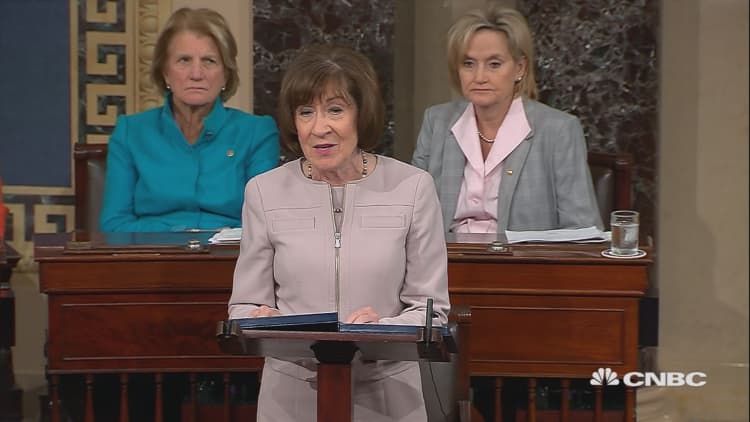Sen. Susan Collins is facing new backlash from Democrats for her 2018 vote to confirm Justice Brett Kavanaugh to the Supreme Court, putting the Maine Republican on the defensive as she seeks a fifth term.
The progressive group Demand Justice announced Tuesday it will spend hundreds of thousands of dollars on a new digital ad campaign geared toward moderate voters in the state who support abortion rights.
"Her vote to confirm Judge Kavanaugh made me realize that Susan Collins was not true to her word when she said that she supported a woman's right to choose," a woman named Amy says in the new 30-second spot.
The campaign comes as Collins is seeking reelection to the Senate, where she has cast herself as a moderate.
She has been dogged by her vote for Kavanaugh and for the 2017 GOP tax overhaul, which slashed rates for corporations and has been perceived as a boon to wealthier Americans.
Collins could face challenges from Republicans, too. She is seen as one of a few moderate Republicans whose votes could weigh against President Donald Trump in his Senate impeachment trial, which begins in earnest on Tuesday.
A spokesman for the Collins for Senator campaign said in a statement that Demand Justice is "yet another out-of-state dark money group that thinks it can tell Mainers how to vote."
"Unfortunately for them, people here in Maine like and trust Senator Collins and reject partisan groups like this that lie and distort the truth," spokesman Kevin Kelley said.
Collins, who won her 2014 Senate reelection with 68% of the vote, is now one of the most vulnerable GOP lawmakers. She is the least popular lawmaker in the Senate, according to a new analysis of survey data compiled by Morning Consult. Her net approval rating declined 4 percentage points, to -10%, between the third and fourth quarters of 2019, Morning Consult found.
Collins is also running for reelection on a ticket with an unpopular Republican president in a state that has voted for every Democratic presidential candidate dating to Bill Clinton in 1992. Trump is 6 points underwater in net approval in Maine, according to Morning Consult.
Democrats have seized on Collins' vulnerability. A campaign to raise funds for her Democratic opponent is nearing its $4 million goal.
Brian Fallon, Demand Justice's executive director, said in a statement that the group will "make sure Mainers know the consequences of Collins' vote to put Kavanaugh on the court."
"Kavanaugh will likely be the deciding vote in a number of major cases this term, and Collins will own every one of those rulings," Fallon said.
Collins has said she supports abortion rights, but reproductive rights groups were deeply skeptical of Kavanaugh's nomination. Collins said at the time that she voted to confirm him after he assured her that he viewed Roe v. Wade, the landmark abortion ruling, as "settled law."
The top court will hear its first abortion case with Kavanaugh on the bench in March, and a decision is expected by the end of June.
That case concerns the legality of a Louisiana abortion law that requires doctors who perform abortions to have admitting privileges at a hospital within 30 miles of the facility where the abortions are provided. Opponents have said the law would effectively limit the state to one abortion provider.
The Supreme Court temporarily blocked the law from going into effect in February. Kavanaugh wrote at the time that he would have allowed the law to go into effect in order to assess the impact it would have on the state's abortion clinics. Chief Justice John Roberts joined the court's four liberals to block the law.
Collins, pressed at the time to defend her vote for Kavanaugh, told CNN that she believed his dissent in the case was "very careful."
"I think there is a deliberate misreading of what he actually wrote, or people have just assumed and not read the decision," she said.
Demand Justice launched a similar ad campaign in October, marking the one-year anniversary of Collins' Kavanaugh vote.



